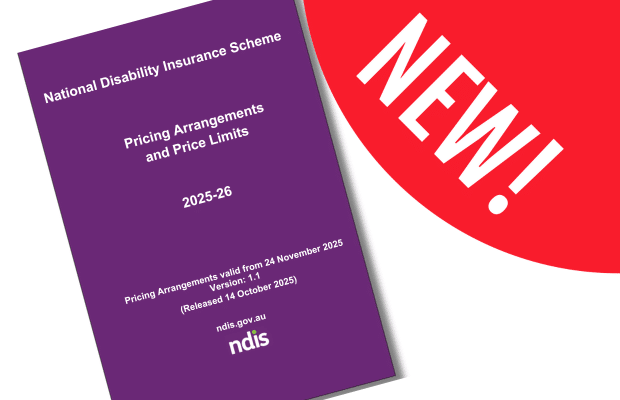The NDIS has announced 2 new updates this month:
- An update to its Pricing Arrangements and Price Limits (see below)
- An update to its Therapy Guidelines (See here)
This resource focuses on an update to the NDIS Pricing Arrangements and Price Limitsn guide.
NDIS Pricing Arrangements and Price Limits
These are the guidelines that decide:
- how much providers can charge and
- what your NDIS funding can be used for.
The new version (called v1.1) kicks in from 24 November 2025, and there are a few changes worth knowing.
We’ve broken down the changes for you in plain English – so you don’t have to read through 144 pages!
Download the latest NDIS Pricing Arrangements and Price Limits 2025-26 v1.1 HERE
What’s changed?
Art & Music Therapy Prices Have Changed
If you use Art or Music Therapy, the NDIS has lowered the maximum hourly rate. They did announce this a few weeks ago, but this change will officially be in place as of 24th November.
It’s gone from $193.99 down to $156.16 per hour.
What this means for you:
- If you are Plan Managed or Agency Managed, your provider must redice their rates to match the new rate as you cannot pay more than the NDIS price limit for any service!
- If you are Self Managed, you can continue to pay the higher rate but will not be receiving funding at that level so you will run out of funds.
The NDIA updates these rates from time to time to make sure prices are fair and consistent for everyone.
Goodbye to COVID Add-ons
All the old COVID-related supports (like PPE reimbursements, cleaning, and special COVID addenda) have now been completely removed.
This means no more temporary COVID rules — everything is back to standard NDIS pricing and claiming.
Low Cost AT (Assistive Technology) Changes
The “Low Cost AT – Capacity Building” support item has been removed. This was previously available in the ‘Capacity Building – Improved Daily Living’ budget.
You can still buy low cost assistive technology (like small devices or daily living tools under $1500), but it’ll will now usually come from your Core Supports – Consumables budget
TIP: If you’re unsure which budget to use, your Plan Hero Plan Manager can help you check before you buy.
Updates for Regional & Remote Areas
The NDIS has updated its Modified Monash Model (MMM) — this is the tool that decides which areas count as Remote or Very Remote (and where higher price limits apply).
A few places have been reclassified and are no longer considered remote, including:
- Green Head and Leeman (WA)
- Blythdale, Euthulla, Orange Hill and Horrocks (QLD)
TIP: If you live in one of these areas, your provider must now use the standard rate (lower) instead of a remote one.
Some Wording Has Been Updated Too
A few sections in the document have been tidied up or clarified, including:
- Clearer info that plan-managed participants hire their own providers (your Plan Manager handles the payments, not the delivery).
- Updated names for community and social activities to match the official NDIS support list.
- More consistent references and links to “Supports that are NDIS supports lists.”
When Does It Apply?
All changes take effect from 24 November 2025.
If you’re a Plan Hero Participant and unsure whether something in your plan is affected, reach out to your Plan Hero Plan Manager. They will be happy to walk you through it.
What does this mean for you?
Here’s the short version:
- Some therapy rates have changed, especially Art Therapy
- COVID items are gone – no more reimbursements for PPE goods
- One assistive technology item has been removed
- Some towns have been reclassified and are no longer rural/remote
If your supports cross over the change date (24 November 2025), your providers should automatically update their pricing.
How Plan Hero Can Help
We know these updates can be a bit confusing, that’s why we keep on top of them for you. All Plan Hero participants have their own dedicated Plan Manager that gets to know them and will:
- Make sure all claims follow the latest NDIS pricing rules
- Double-check provider invoices to keep your plan on track
- Help you understand where your funding can (and can’t) be used
So you can focus on living your life, and not trying to decode policy documents.




